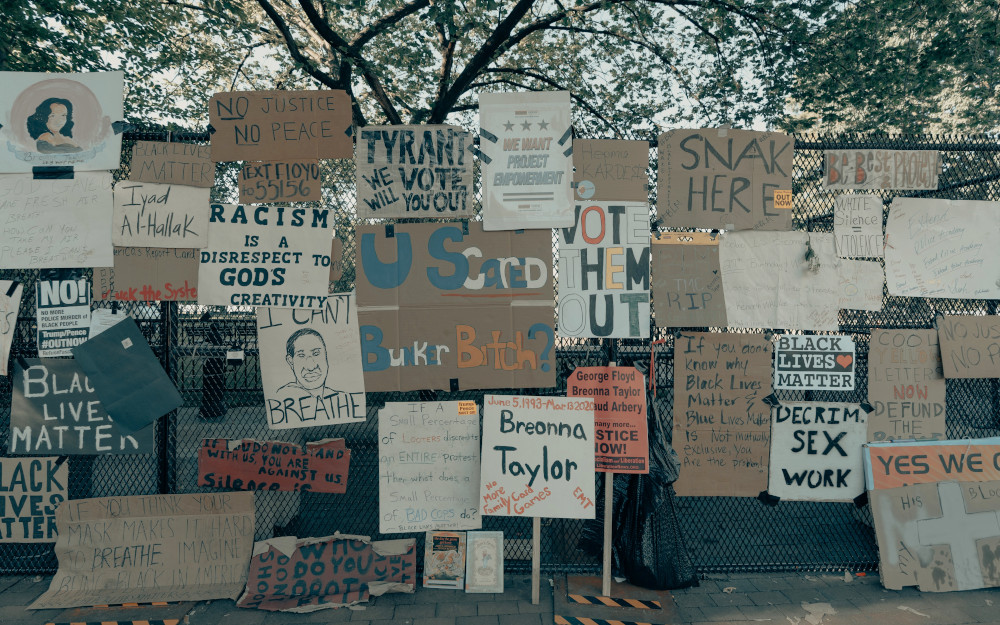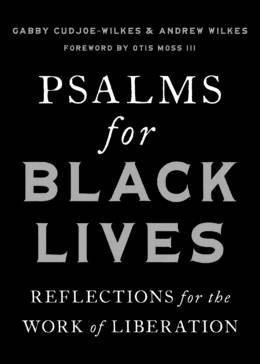
(Unsplash/Clay Banks)

In the summer of 2020, many took to the streets armed with righteous indignation against the white supremacist brutality and violence against Black people far too commonly found in North America. People from coast to coast marched in protest of the deaths of three more Black people: George Floyd, Breonna Taylor and Tony McDade.
That summer created more activists and people with hearts burning to love justice, seek mercy and walk humbly with God on behalf of the historically underrepresented, marginalized and disenfranchised. This was the summer when pastors Gabby Cudjoe-Wilkes and Andrew Wilkes conceived Psalms for Black Lives: Reflections for the Work of Liberation.
During this summer, the Wilkeses had called their Brooklyn-based church, The Double Love Experience, to an eight-day fast. They prayed, participated in civic action and read the Psalms together. Those eight days led to six months of Wednesday prayer sessions where they reflected on the Psalms as a community. It was out of this sustained time with the Psalms that the couple began to compose devotionals.
Advertisement
Psalms for Black Lives: Reflections for the Work of Liberation is a 30-day devotional book that takes individual readers through the many dimensions of the Psalms, inviting the reader to celebrate, lament, envision and be emboldened to act. The goal is for the devotional reader to develop what the authors call a "justice imagination," one that allows us to hope beyond hope that justice will materialize on this plane of reality. As they say in the book's introduction, "In a time period when folks laugh at us for believing justice is possible, those with a justice imagination find it within their hearts to imagine anyhow."
A prerequisite to this justice imagination is a posture of defiant confidence, which the Wilkeses define as the ability to confront intimidating circumstances. Each devotional day offers the reader four opportunities to develop a justice imagination through scripture reading, an incorporation of theology, strategy and political science, a devotional based on the scripture and a set of reflection questions.
I sat with this devotional for 30 days — even repeating some days for effect — to get a complete sense of the work. At first blush, I expected this book to be a hard-hitting, militant devotional for Black people who, in the words of Fannie Lou Hamer, are "sick and tired of being sick and tired." I sized it up this way based on the book's matte black cover and stark font choice. However, upon closer inspection, the book's cover foreshadows the reader's experience.
The font of Psalms for Black Lives looks vintage, like the large keepsake Bible many Black families keep that holds milestones, births, and death. The font is also reminiscent of the aged nature of the Psalms, a book composed over five centuries that moves with us from generation to generation. "Black Lives" are the two most significant words on the cover, in a grey text that may be perceived as fading away, but that is bold in its constitution. Bold is what I prepared for as I sojourned through this text, yet with each day I engaged the devotional, I was not greeted with a Black power fist, but rather open hands.
Demonstrators in Grand Rapids, Michigan, hold signs April 15 protesting the April 4 fatal shooting by a police officer of Patrick Lyoya, an unarmed Black man, during a traffic stop. (CNS/Reuters/David Delgado)
On my second day of reading, I prepared to point fingers as I read "Who Are the Wicked?" based on Psalm 1:1-6. I knew whom I thought the wicked were. The wicked are those police who killed Black people, corrupt politicians, white Christian nationalists and white supremacists. I had no doubt this was also the conclusion to which the Wilkeses would point. They did not.
Instead, they said, "If we're not careful with this psalm, it can cause us to think more highly of ourselves than we should." They then invite the reader to consider who the wicked are, including to see if the one finger pointing to the so-called wicked does not also point back to ourselves. Their intention is not to use the reader as a scapegoat, but to help the reader recognize how easily anyone can fall into the category of the wicked by not being in the fight against evil and injustice.
One day is devoted to praying for our leaders through what the authors perceive as the moral imperatives of political authority embedded in the Psalter. Specifically, Psalm 72 stands as a reminder that our leaders ought to defend the cause of the poor, give deliverance and crush the oppressor (Psalm 72:4). Here, the Wilkeses empower the reader to remember that they are emboldened to act — and ensure that elected leaders act — in the interest of the common, not individual, good.
Another day is dedicated to delighting in the Lord, first by being prayerful about our words and then by meditating on God's heart. This is framed within the day's reflection with the concluding verses of the Psalm, "Let the words of my mouth and the meditation of my heart be acceptable to you, O Lord my rock and my redeemer," a popular preamble to the preaching moment in the Black church which here expands to touch lives beyond the pulpit. The authors suggest that we are all responsible for minding and mining our words to engender how we delight in the Lord.
People in Washington walk past a sign about the Black Lives Matter movement Feb. 21, 2021. (CNS/Reuters/Al Drago)
The authors suggest that we are all responsible for minding and mining our words to engender how we delight in the Lord.
Within Psalms for Black Lives there is such a spread of celebration, lamentation and emboldening Psalms that no two days find the reader in the same place. As a result, the reader is at the mercy of the text and is thrust into engaging the Psalms in a way that mirrors the rhythm of life. Some days we have much to celebrate, others we have much to grieve; and on most days, we have work to do.
Psalms for Black Lives focuses on how its Black readers can speak a new world into being — and gives them a soft place to land as that world forms. This soft place is essential for Black people who often feel nothing but the world's harshness. The Wilkeses resist that harshness through amplifying both the Psalms and voices of such faithful as St. Teresa of Avila, St. Augustine and Howard Thurman.
While I understand this book to resonate with Black readers in particular, non-Black readers can benefit from reading it as a practice of solidarity. In this way, Gabby Cudjoe-Wilkes and Andrew Wilkes have written a devotional that makes the work of liberation of Black lives a sacred matter for all.








